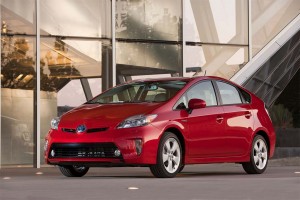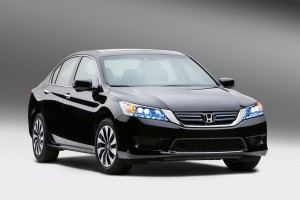
The Toyota Prius continues to dominate the hybrid segment...but it is facing some challenges this year.
Once a rare technology limited to a handful of – mostly Japanese – manufacturers, the industry is unleashing a flood of new hybrid vehicles for 2014 covering just about every niche on the market. Automakers such as BMW, Ford and Hyundai hope their latest offerings will finally give them the momentum they need to take on the hybrid segment’s best-selling brand, Toyota, which underscored its dominance with the sale of its 3 millionth Prius last month.
For many potential buyers around the world, in fact, the Toyota Prius is no longer a niche vehicle. The gas-electric hatchback may be the most popular hybrid in the U.S. – routinely outselling all other hybrids combined — but in Japan it is now the best-selling vehicle overall.
“They’ve turned it into an iconic status of fuel efficiency – whether you love it or hate it,” says Dave Sullivan, automotive analyst with AutoPacific, Inc. “It’s the benchmark of hybrids.”
That said, 2013 could be a challenging year for Prius. A senior Toyota official cautions that the hybrid might fall short of its sales targets, something that certainly wouldn’t upset competitors like Honda.
The third-largest Japanese maker introduced its original Insight hybrid about the same time as the Prius debuted back in 1999 – and the Honda hybrid actually launched in the U.S. ahead of its Toyota rival. But the original, two-seat Insight generated more headlines than customers and was yanked from the market in 2006. Even a new 4-seater that returned in 2008 has had to take a back seat to Prius.
As have all the other hybrids that have hit the market since the Toyota model’s debut. Combine them all and they routinely fall short of Prius on the sales charts – though Toyota has played some marketing tricks. There actually are four different models now designated Prius: the original hatchback, a plug-in hybrid version, a larger gas-electric model dubbed the Prius V, and a smaller Prius C.
Going into 2013, Toyota had high hopes for what it calls the “Prius family,” predicting sales would jump to 250,000 or more, up from last year’s 236,659. But Bill Fay, the U.S. general manager for the Toyota brand, tells Reuter’s “The 240,000 to 250,000 range is kind of where we’re settling our sights for the Prius family.”
And even that might be a stretch. U.S. sales of the Toyota Prius family fell 5.1% during the first half of the year, even as the Japanese maker’s overall American sales jumped 6%.
Certainly, it doesn’t help that U.S. fuel prices have slipped sharply from the near-record levels they hit at the beginning of the year. Indeed, that’s helped propel a surge in the full-size pickup market. But despite declining gas prices, small car sales have remained surprisingly solid. And that may be part of the problem for Prius.
Toyota gets plenty of credit not only for pioneering high-mileage hybrid technology but also for adopting a distinctive, lightweight and aerodynamic design that has made Prius an iconic stand-out in a market where many motorists want to show off their concern for the environment.
Of course, it also helped that in its early years, the Prius also qualified for access to carpool lanes, especially in traffic-snarled Southern California, even with just one person aboard. But the Toyota hybrid lost that badge several years ago and many motorists “have moved on to the new status symbol vehicles that zoom by everyone else,” suggests Sullivan.
Meanwhile, he adds, there is a growing list of high-mileage alternatives to Prius that, in many cases, deliver as, or nearly as, good fuel economy along with better features, more lavish interiors, better performance and improved driving dynamics.
“Full hybrid models are coming one after another,” writes Kurt Sanger, auto analyst with Deutsche Bank, in a study of the high-mileage segment.
Honda, for example, will add a new version of its Accord Hybrid next autumn that will feature a better-performing two-motor gas-electric driveline. In fact, Honda is in the midst of rolling out three distinct new hybrid drivetrain technologies, one of which will be used on the reborn Acura NSX supercar due to market late in 2014.
It’s now difficult to find a manufacturer that doesn’t offer a hybrid model – often several, as with not only Honda but Ford and BMW. The German maker has set out to demonstrate that while hybrid technology can save fuel it also can help boost performance when shifted to Sport mode.
“And there’s growing competition not just from hybrids” but from more conventional technologies, notes Sullivan. The latest Mazda6 and Nissan Altima sedans get as much as 38 miles per gallon on the highway, while the all-new Chevrolet Cruze Diesel is rated at 46 mpg.
Few expect the Toyota Prius to fade away anytime soon. The fact that it ended June with global sales of 3.67 million since its 1999 debut attests to the nameplate’s power and longevity. But the recent slowdown raises a caution flag that even the most powerful brand names aren’t invulnerable. Toyota plans to amp up its marketing for the Prius family in the months ahead, but you can be sure that the competition will be taking aim, as well.


There is going to be a lot of scrap iron in junk yards with toxic waste issues in the next 3-5 years…